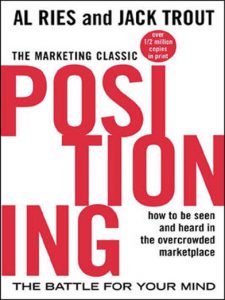
by Alex Patton | Mar 7, 2013 | Political Consulting
I was having lunch with a client this past week, and I was told in no uncertain terms of a mutual acquaintance that does not like me personally.
In fact, it was expressed to me that this person hates the living daylights out of my guts. Let’s set aside the fact that he and I have never had a conversation and have most likely have said ‘hello’ to each other twice in passing. (Let’s also set aside that I am a extremely lovable & loyal guy.)
It was explained to me that he hates my guts because he doesn’t like that “Alex Patton engages in negative campaigning.”
This conversation was running through my head as I went home and re-read a classic book by Al Ries and Jack Trout, “Positioning: The Battle for your Mind”.
I last read the book about 5 years ago, but you could tell from my scribbles in the margins and markup, I liked the book.
I think my favorite line from the book:
“culture and refinement may be admirable qualities, but not in advertising.”
Positioning: The Battle for your Mind, pg 69
I often think about that quote and the book when working with political clients.
Here is another quote from the book that seems appropriate:
“to climb on his or her product ladder, you must relate your brand to the brands already in the prospect’s mind.”
Positioning: The Battle for your Mind, pg 69
This is especially true when a candidate is challenging an incumbent.
Let’s relate a campaign to a business endeavor, since so many business people think they have the political answers.
The situation is you are a challenger to an incumbent or brand leader. You, the challenger, are now going after market share in the voters mind. A space that we can assume the incumbent is the market leader with at some point receiving at least 50% plus 1 market share.
What to do?
I have seen way too many candidates make the childish, amateurish mistake of challenging the brand leader for market share and attempt do it without mentioning the brand leader.
A candidate can not write a campaign speech not mentioning the incumbent and not comparing yourself directly to the incumbent. It is a recipe for a complete disaster. After all, if a challenger is no different, then the consumer will remain with the market leader.
If a candidate is challenging the incumbent,”you must relate your brand already in the prospect’s mind” otherwise a candidate best be prepared to spend ungodly amounts of money in an endeavor still likely to have a low probability chance of dislodging the market leader.
If a candidate does not have the confidence to position him/her self against the brand leader and explain how he/she is different, the challenger will never break through the clutter and noise of a campaign. A challenger will say a lot, yet at the same time say absolutely nothing.
A challenger will campaign and most likely run a campaign that he/she finds to be “cultured and refined”. Congratulations, you just got your butt kicked. Please, enjoy the opera.
Let’s be clear, I do not take joy in negative campaigning nor do I use it in every campaign. However, when the situation calls for it, we will not hesitate to perform our duties for our clients to help them navigate to victory.
And you know what? I am okay with that.
PS. And to prove that I am such a lovable guy, I will be sending a copy of the book to some of my ‘favorite’ unsuccessful candidates, maybe they can read it and re-tool for their next run.
by Alex Patton | Feb 4, 2012 | Political Consulting
How do I set a campaign budget?
We get asked all the time How do I set a campaign budget?
 In the spirit of sharing, we thought we would share our political campaign budget worksheet.
In the spirit of sharing, we thought we would share our political campaign budget worksheet.
It is in excel format.
Love to know if you feel we left anything out of the worksheet.
by Alex Patton | Jan 17, 2012 | Political Consulting
This will be a series of blog posts that will explore simple How to steps for political campaigns.
It will not be overly comprehensive or detailed, but it will take discuss the major steps that a potential candidate will need to go through.
How to plan a political campaign
Step 1. Make the decision to explore
We wrote an earlier blog post entitled ‘first time candidate checklist‘. While we wrote it specifically for the first time candidate, we still think the process has merit.
You need to take inventory of your life before you make this decision, and you need to discuss it with any and all significant others in your life. The time on the campaign trail can be lonely and without your support group, it can be miserable.
Step 2. Political Research
How does the district you are considering running in perform? Look at the past 3 elections cycles.
Start to rough out a budget. Can you raise enough resources to compete and win? On of the bigger mistakes we see, is a candidate basis their campaign budget on what the candidate before them spent – normally a losing campaign. If you don’t know how much things cost, call a political consultant for some rough pricing. If you can’t find a consultant, contact us.
What are the campaign finance rules governing your election? Florida’s Campaign Finance Laws (note please check all jurisdictions that are applicable to your potential election – federal, state, county, and local laws)
Is there an incumbent? Can you make a case of why the incumbent should be fired and you hired? (HINT: If not, reconsider)
Take inventory of the current political climate? If you have the resources consider a poll (please, check first with your campaign laws).
What other campaigns will be happening at the same time that will shape the climate?
What are the important dates of the election(s) , qualifying deadlines, financial reports, etc. Do these cause you any headaches?
Any special considerations? For example, is there a resign to run law in your jurisdiction?
Step 3. Make the decision to run or NOT run
Once you have completed your research, starting roughing out a written campaign plan.
- RESEARCH
- CLIMATE OVERVIEW
- CALENDAR
- FINANCIAL BUDGET
- PEOPLE BUDGET
Then read it, step back, and go for a walk. At this time, you may decide you have higher priorities then serving the public.
At this time, you may just decide that this is not the right time for you.
That is okay at this point. True, you are going to be out the time you invested; however, you haven’t accepted contributions or invested money.
NOTE: Please, don’t skip these steps.
Even if your uncle is a Congressman and will personally take you to meet your party’s congressional campaign committee, you will still need to be able to discuss a rough plan of how you can win the district.
You don’t want to be the candidate that just shows up or starts calling people saying “I’m running for office” (please don’t be that person!)
When to talk to a political consultant?
We do get asked this all the time. When do I bring in a political consultant? We personally like to be involved sooner than later, but we also love it when a candidate approaches us with at least a minimum understanding of the potential undertaking. That is when we know it is the beginning of a beautiful relationship.
Next Steps to plan a campaign
If you decide to move one with planning a political campaign, congratulations, it is time for the next steps.
by Alex Patton | Jun 14, 2011 | Political Consulting

Candidate Check List
Ozean Consulting has worked with a number of first time political candidates. They all have a lot in common – the biggest thing is “No first time candidate is as ready as they think they are.” The only exception to this is first time candidates that have been intimately involved in campaigns, and even then there is a learning curve, especially on the fund-raising side.
So, in an effort to help all first time candidates, Ozean Consulting offers the following mental check list that all first time candidates should go through before announcing.
Decided if you really want to run for office:
1) Talk to your Family. We mean REALLY talk. A couple of reasons:
- Campaigns are stressful on the family.
- You are away. You will be gone – fundraising, walking neighborhood, events.
- You can be attacked and your secrets will come out. You need to make sure there is nothing you want to tell your spouse before you announce.
- Have school age children? Your campaign will become a conversation piece for kids and their parents.
2) Think about your employment situation -even if you are the boss/owner/ceo – A couple of reasons:
- Campaigns are stressful on the work environment.
- You are away. Your lunches will be expanded in time so that you can travel across town to attend the X luncheon. You may come in late so that you can attend the X breakfast. You may leave early so that you can attend X meeting.
- Who will pick up your slack and more importantly will they resent it?
- If you win, and you have to attend day long meetings or if you goto Tallahassee and have to be gone for weeks or months – how will you get your “real” job done?
- The minute you announce you are a Republican that wants to end X program, and your best assistant OR YOUR BOSS has an Uncle dependent upon X program, you are going to hear about it.
- If you are not the boss, ask for permission. I am amazed on how many people don’t tell their employer they are thinking about running. You need to have a plan that addresses the points above, but you must have the discussion.
3) Answer this question, if I win, then what?
- What will my family life be like? If I have meetings every Wednesday and Junior has baseball games every Wednesday, am I willing to sacrifice? If I am gone for two months to Tallahassee and it takes me 5 hours to travel, will my family join me for session in Tallahassee? etc. etc.
- What will my job be like? Is there a different role I may need to explore with the company? Who in the organization can pick up my duties at least partially? If I own the company, do I have the support staff needed? Can I find them?
- Can I afford it? really! What is the opportunity cost to you getting elected? Will your billable hours be reduced to be replaced by a $30,000 annual salary? Are you ok with that?
Once you get the home life and the financial life settled and have buy in from all, next you need to do some quiet research to decide what is the probability of winning.
Decided if you can win:
1) Fundraising
- No first time candidate, unless they have done it, can fully appreciate the time, effort, and difficulty in raising money.
- Do you have 100 -150 friends that will give you X donation? Is that enough to win?
- More importantly, ARE YOU WILLING TO ASK 100-150 friends to give you X donation? Is that enough to win? (I have witnesses many self assured candidates fall to pieces asking for money.)
- Most candidates will need to spend 70-80% of their time raising money. No one else can take on this role for candidates, they have been and will remain the Chief Fund Raiser in Charge.
- Before you announce take out a sheet of paper, write a name, a phone number, and how much you are going to ask them for. (yes, the phone number is important – if you don’t have it handy, you may not be as close as you think you are). Total it up. Take a list of previous contributors to like candidates? Know them? write it down. etc. [side-note: When I ask first time candidates to make this list, we total it up, cut it by 50%, then cut it again by 25% – and that is the initial internal working budget]
- Is the timing right? When do I need the money in the bank? Need to raise $150,00 and you have two weeks until qualifying? You may want to reconsider.
2) District
- Do I meet any residency requirements? Some districts have residency requirements, some you must live in for a period of time to be eligible to run.
- Do I meet any other requirements? Age, etc.
- If no residency requirement before the election to office, are there after? Do I need to move? If so, what is the plan?
- What is the past performance of the district? Voter Registration is a starting point, but you really want the PERFORMANCE for your district. Get as many data points as you can get your hands on. If you are a Republican, and the district you wish to run for performs 63% Democratic, you may want to reconsider. The dirty little secret? You may be the most incredible potential politician to walk the face of the Earth – but if you are in the wrong district, you may stand a significant chance of not winning.
3) Political Environment
- What else will be going on during your potential ballot? Are you running during a presidential election, a gubernatorial election, or a stand alone election? How will other races affect your ballot? Are there any amendments or proposals on the ballot that may affect turnout?
- What is the mood of the electorate? Don’t know? Talk to people- fast. Don’t know? Poll.
Any first time candidate has a period of soul searching that they must go through. Set the ambition & ego aside, do a little research, and then take a very long walk on the beach.
If you are in, you should then be able to say
“I have thought through and talked about my family situation and my employment situation, and I have gotten buy-in from both. I have the beginnings of a Fundraising plan – HERE IS MY FUND RAISING LIST, and my goal is to raise $X within 30 days of filing my paperwork. I am eligible to run in district x. I have researched the past performance of the district, and in this current political environment, the voters stand a good shot of electing someone of my political persuasion. ”
If you can say the above paragraph, then you are more prepared then half of the first time candidates that we have worked with.
One last thought, the above checklist is just the beginning. The hard lifting starts after the check list is complete.
Don’t worry, Ozean stands by waiting to discuss the rest of the path to victory.




